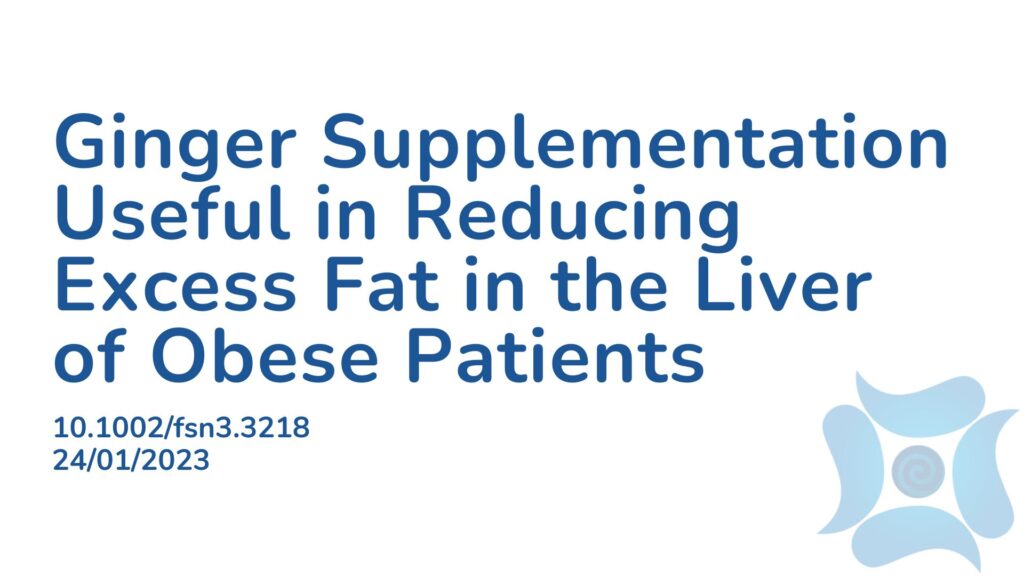Summary:
Due to an increase in rates of obesity in children, nonalcoholic fatty liver disease (NAFLD) is now increasingly seen in children and young adults. This study examines whether the combination of ginger and an anti‐inflammatory diet in children with obesity can help manage weight as well as fatty deposits on the liver. This randomized controlled trial included 160 children, 8-11 years, who have obesity. The average weight of the children was 65 kg. Children were administered either ginger capsules, an anti-inflammatory diet, both, or neither. The anti-inflammatory diet consisted of fruits and vegetables, fish, lean meat, omega‐3 sources, nuts, legumes, probiotics and an elimination of inflammatory food. The results showed that inflammatory markers were significantly decreased in the anti-inflammatory diet group and in the group with both the ginger and diet there was a significant decrease in body mass index, total cholesterol and inflammatory markers. The main finding of this study was that hepatic steatosis, which is extra and harmful fat that accumulates in the liver, significantly decreased in the ginger only group, as well as the ginger and anti-inflammatory diet group. This means that ginger supplementation alone can effectively improve NAFLD in children, and its effectiveness is further increased when combined with an anti-inflammatory diet.
Abstract:
Nonalcoholic fatty liver disease (NAFLD) is the most common cause of liver disease in children. Following earlier reports on an increase in the prevalence of childhood obesity, NAFLD is now becoming increasingly common in children. Although no definitive cure exists, early management, early diagnosis, and treatment can reduce its complications. This study aims to determine the effectiveness of the combination of ginger and an anti‐inflammatory diet (AID) in children with obesity on fatty liver management. This randomized clinical trial was conducted on 160 children with obesity aged 8–11 years, with a mean (SD) weight of 65.01 (9.67) kg, mean (SD) height of 139.87 (7.37) cm, and mean (SD) body mass index of 33.40 (5.59) kg/m2. The study duration was 12 weeks. Children were divided into four groups: ginger (G), AID, ginger plus an AID (GPA), and control. Ginger capsules comprised 1000 mg of ginger, whereas the AID comprised fruits and vegetables, fish, turkey, and chicken (without skin) with lean meat, omega‐3 sources, nuts, legumes, probiotic products, and elimination of inflammatory food. Following the intervention, serum fasting blood sugar and high‐sensitivity C‐reactive protein levels were significantly decreased in the AID (p = .006 and .002, respectively), G (p = .04 and <.001, respectively), and GPA (p <.001 in both cases, respectively) groups. Further, in the G and GPA groups, there was a significant decrease in body mass index (p = .04 in both cases, respectively), waist circumference (p = .009 and .003, respectively), waist‐to‐height ratio (p = .02 and .005, respectively), alanine aminotransferase (p = .004 and <.001, respectively), total cholesterol (p = .0002 and .0001, respectively) and low‐density lipoprotein‐cholesterol (p < .001 and <.001, respectively). Eventually, serum aspartate aminotransferase was decreased (p < .001) and high‐density lipoprotein‐cholesterol (p = .03) was increased significantly in the GPA group. As a main finding of this study, hepatic steatosis significantly decreased in the G and GPA groups. Ginger supplementation can effectively improve NAFLD in children, and its effectiveness was further increased when combined with an AID.
Article Publication Date: 24/01/2023
DOI: 10.1002/fsn3.3218




